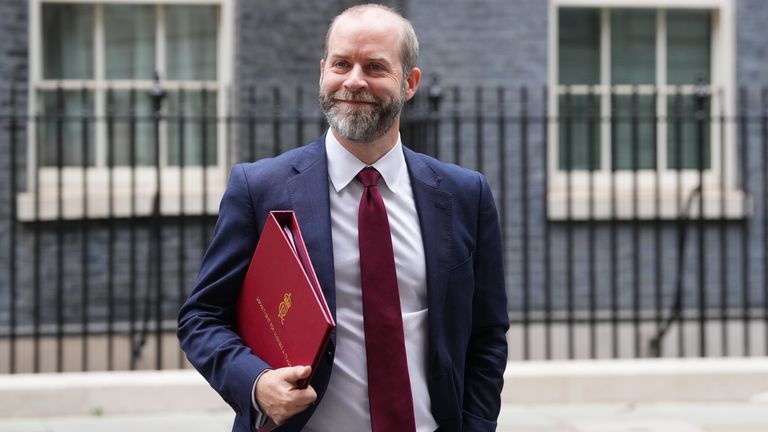The new government has confirmed two major changes to the way in which the minimum wage is set.
Jonathan Reynolds, the new business secretary, has ordered the Low Pay Commission (LPC) to change its remit so the body must in future factor the cost of living when deciding the rate of the minimum wage and national living wage.
The measure is likely to further blur the difference between the minimum wage and the national living wage - long reflecting unhappiness in the labour movement about the latter.
The minimum wage, introduced by the last Labour government in 1999, is legally enforceable.
Money latest: Greggs price hikes revealed
The national living wage, introduced by the Conservatives in 2016, is calculated according to the basic cost of living - but is not legally enforceable and the decision on whether or not to pay it is left up to the employer.
The second change announced today is that the LPC has been ordered to narrow the gap between the minimum wage rate for 18 to 20-year-olds and the national living wage.
Ministers aim eventually for 18 to 20-year-olds, who are currently on the national minimum wage rate of £8.60 per hour, to receive the national living wage - currently set at £11.44 an hour.
The move builds on changes made by the last government - which in 2021 reduced the age threshold at which a worker qualifies for the national living wage from 25 to 23 and then, in April this year, reduced the threshold from 23 to 21.

The two measures have been welcomed by the unions.
Paul Nowak, general secretary of the Trades Union Congress, said: "Hard work should pay for everyone. These are significant first steps towards making the minimum wage a real living wage and will make a difference to millions.
Mr Nowak said polling suggested that seven in 10 voters, of all parties, support removing a lower rate for young workers.
He added: "It is not right that young workers are paid less for doing the same job as older colleagues.
"The government is right to commit to ending discriminatory age bands for minimum wage workers. There is no justification for keeping them.
"Young people face the same cost of living pressures as other adult workers and will welcome their pay being brought into line."
The move is not without risks, however, which ministers have appear to have acknowledged.
Significantly, the LPC is not being asked to abolish age bands in one go, but is being asked at this stage simply to "narrow the gap".
This may be to avoid a sharp rise in costs for businesses and particularly for those in sectors, like retail and hospitality, which have a large proportion of their workforce on the minimum wage.

This was underlined today when Greggs, the UK's biggest bakery chain, said it had recently raised the price of some of its most popular items by between 5p and 10p to cover higher wage costs. The company, which employs 32,000 people, pays all of its workers above the national living wage.
Roisin Currie, chief executive of Greggs, told the PA news agency: "The biggest inflation cost right now is the increase in the national living wage and making sure our employees get the wage increases that are appropriate.
"That puts pressure on the cost increases within the business."
Kate Nicholls, chief executive of the industry body UK Hospitality, warned last week of the impact of equalising pay rates for younger and older workers.
In an opinion piece for the business publisher and data provider William Reed, she wrote: "The biggest question over employment changes is affordability, particularly when it comes to wage costs and proposals to abolish age bands.
"The rises this year to minimum wage rates were incredibly challenging for businesses to absorb, on top of cost rises in every other area of the business and little mitigation in other areas.
"Continuing to pile costs onto businesses is not the solution to a sustainable sector."
There is also a danger that, if the gap between pay rates for 18 to 20 year olds and other workers is removed too rapidly, younger workers could lose out.
The reason younger people have, until now, had a lower minimum wage has been to prevent employers from being discouraged from hiring younger workers with less experience than older colleagues.
Asked to choose between an 18-20 year old employee with little experience and an older worker with several years of relevant experience, when both are on the national living wage, most employers would probably opt for the latter.
But in March this year, the LPC itself called for the gap between the youth rates and adult rates of the national living wage to be reduced, arguing it had widened in recent years.
The TUC has published research suggesting that, in the UK, the youth rate is three-quarters of the adult rate while in Australia, Belgium and Ireland, the rate is set at 83%, 85% and 90% respectively - while in Germany, New Zealand and France, 18-20 year olds have the same minimum wage as older workers.
Read more from Sky News:
Vinted fashions $500m share sale
Reeves accuses Hunt of lying about 'true state' of UK finances
Watching events closely will be the Bank of England's monetary policy committee.
At its last meeting, on 19 June, it noted that the Bank's network on regional agents had picked up on the impact of the near 10% rise in the main rate of the national living wage at the beginning of April.
They said: "Contacts from those consumer-facing businesses that were most exposed to the national living wage had generally reported higher settlements."
So abolishing the age bands only gradually is clearly an attempt to reduce the risk that doing so at once would cause a spike in inflation.
Expect, though, the unions to hold the government's feet to the fire on this issue if they do not feel progress is being made.
Disclaimer: The copyright of this article belongs to the original author. Reposting this article is solely for the purpose of information dissemination and does not constitute any investment advice. If there is any infringement, please contact us immediately. We will make corrections or deletions as necessary. Thank you.



